BRAHMS
HIS LIFE AND WORK
B RAHMS
HIS LIFE AND WORK
KARL GEIRINGER
IN COLLABORATION WITH
IRENE GEIRINGER
Third Edition, Revised and Enlarged, WITH A New Appendix: Brahms as a Reader and Collector"





TO THE MEMORY OF MY MOTHER
BY THE SAME AUTHOR
Instruments in the History of Western Music
THIRD EDITION
Haydn: A Creative Life in Music
THIRD EDITION
The Bach Family: Seven Generations of Creative Genius
SECOND IMPRESSION
Johann Sebastian Bach: The Culmination of an Era
Music of the Bach Family: An Anthology
FROM THE
PREFACE TO THE FIRST EDITION
 s a new biography of Brahms really necessary? Have not enough books been written on the master's life? These questions will be asked by many who hear of this new publication. The answer can only be: Undoubtedly, the number of first-rate books on Brahms is considerable; but so many hitherto unknown documents relating to $rahms, as man and as artist, have recently come to light, that a new work seems not only justified, but really essential.
s a new biography of Brahms really necessary? Have not enough books been written on the master's life? These questions will be asked by many who hear of this new publication. The answer can only be: Undoubtedly, the number of first-rate books on Brahms is considerable; but so many hitherto unknown documents relating to $rahms, as man and as artist, have recently come to light, that a new work seems not only justified, but really essential.
A unique body of material, until now inaccessible to other investigators, has been placed at my disposal. It consists of over a thousand letters received by Brahms from all sorts of correspondents. In accordance with an agreement between Brahms's heirs, they were handed over to the `Gesellschaft der Musikfreunde' in Vienna, and there kept under official seal. As Custodian of this collection, I was authorized to be the first to read and use them for the purpose of my book. The bulk of the letters are from Brahms's mother, father, brother, and sister. They are supplemented by letters from a large number of eminent persons, among them some of Brahms's intimate friends; for example: Eugen d'Albert, Adolf Brodsky, Daniela von Billow, Friedrich Chrysander, Peter Cornelius, Anton Dvorak, John Farmer, Benjamin Godard, Edvard Grieg, Sir George Grove, Sir George Henschel, Ferdinand Hiller, Hermann Kretzschmar, Franz Liszt, Adolf Menzel, Arthur Nikisch, Gustav Nottebohm, C. F. Pohl, Anton Rubinstein, Robert Schumann, Richard Strauss, Karl Tausig, Mathilde Wesendonck. From this valuable source new and interesting documents are available for almost every period of the master's life. Important supple ments to these are: the letters from Clara Schumann and Joseph Joachim to Brahms's parents; a particularly interesting letter from Brahms to Amalie Joachim; numerous letters from Brahms to Hans von Billow; and Brahms's correspondence with J. Allgeyer, which is in the possession of the Viennese Municipal Library. Unknown as yet in the English Brahms literature is the correspondence between Brahms and Eusebius Mandyczewski, the former librarian of the 'Gesellschaft der Musikfreunde,' Brahms's correspondence with Theodor Billroth, and also the master's letters to his Hamburg relatives.
With reference to the master's works, I was once more enabled to draw upon extensive material, which, though of the highest importance, had remained almost unnoticed in former biographies of Brahms. This material consists of the composer's sketches, also preserved by the 'Gesellschaft der Musikfreunde' (the heir to his artistic legacy), which are exceptionally rare, as he generally destroyed all his first drafts. In addition to this there are the manuscripts, which were thoroughly studied, as they give valuable indications of the changes which many compositions underwent between their first conception and their publication. The 'Gesellschaft der Musikfreunde' possessed also Brahms's own collection of single copies of each of his published compositions, in which he noted corrections and alterations for possible further editions, throwing light on his later attitude to his works. Taken 'as a whole, this material illustrates the different phases in the process of composition and gives one a profound insight into the master's mode of working.
I should be reluctant to close this Preface without thanking all those who have helped me in my work. In the first place, I wish gratefully to acknowledge the assistance which the directors of the 'Gesellschaft der Musikfreunde' have granted me, by removing all restrictions to the use of the Brahms legacy for the purposes of this work. Again, my sincerest thanks are due also to Mrs. Lisbe Leacock and Mrs. Helen Perkin-Adie for their most valuable and untiring assistance in preparing the English version of this book. Further, I have to thank, for interesting new material or other important help, Mmes. Ottilie von Balassa, Olga and Else Lewinsky, Alice von Meyszner-Strauss, Mici Popper, Henriette Ribartz-Hemala, and MM. Dan Booth, Robert Caillet, Bronislaw Huberman, Professor Dr. Josef Hupka, President Director Wilhelm Kux, Eugen von Miller, and Professor Paul Wittgenstein.
KARL GEIRINGER
PREFACE TO THE SECOND EDITION
 HIS new edition, the publication of which has been greatly delayed by the Second World War, discusses various compositions of Brahms that were discovered after the book was first printed. The main addition consists, however, in a number of letters by the composer that were previously not available to the English reader. A few are incorporated in the text of the biography, while most of them are to be found in an Appendix at the end of the book. It is hoped that they will contribute to a better understanding of the strange personality of a man who, in spite of his forbidding and often rude planners, had quite an unusual gift for making faithful friends.
HIS new edition, the publication of which has been greatly delayed by the Second World War, discusses various compositions of Brahms that were discovered after the book was first printed. The main addition consists, however, in a number of letters by the composer that were previously not available to the English reader. A few are incorporated in the text of the biography, while most of them are to be found in an Appendix at the end of the book. It is hoped that they will contribute to a better understanding of the strange personality of a man who, in spite of his forbidding and often rude planners, had quite an unusual gift for making faithful friends.
The author is indebted to Mr. Henry S. Drinker of Philadelphia, who performed the most important task of newly translating the complete vocal work of Johannes Brahms into English. These excellent translations are used whenever reference is made to compositions for voice. Sincere thanks are also offered to the editorial staff of the Oxford University Press, New York, for its cooperative and understanding attitude, and to Mr. Walter F. H. Blandford, London, who, as in previous cases, completely revised the English text of this book.
K.G.
Boston, August 1947
PREFACE TO THE THIRD EDITION
 HE selected Bibliography has been updated for this edition. Moreover, a new chapter has been added to the Appendix, dealing with Brahms's unusually strong literary and scholarly interests. Special thanks go to the Musical Quarterly and its Editor, Joan Peyser, for granting permission to use here large sections of an article I previously wrote for the periodical.
HE selected Bibliography has been updated for this edition. Moreover, a new chapter has been added to the Appendix, dealing with Brahms's unusually strong literary and scholarly interests. Special thanks go to the Musical Quarterly and its Editor, Joan Peyser, for granting permission to use here large sections of an article I previously wrote for the periodical.

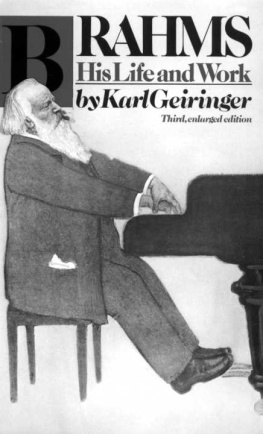

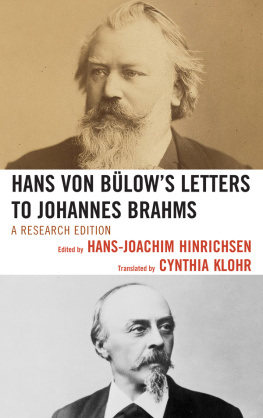
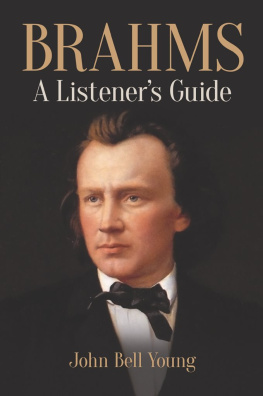

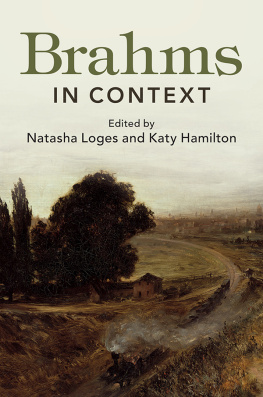
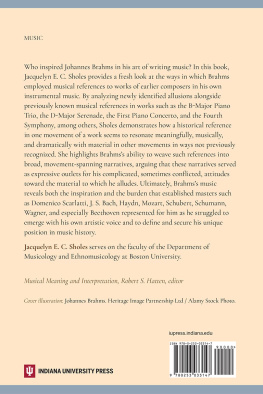

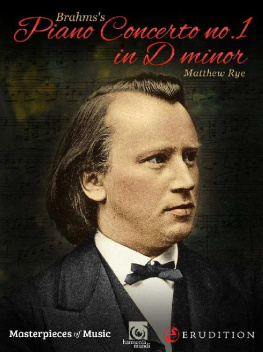
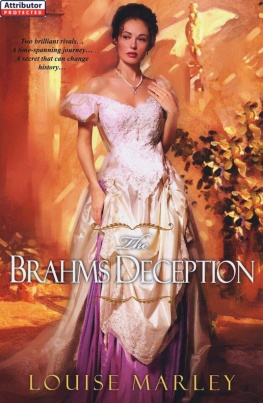



 s a new biography of Brahms really necessary? Have not enough books been written on the master's life? These questions will be asked by many who hear of this new publication. The answer can only be: Undoubtedly, the number of first-rate books on Brahms is considerable; but so many hitherto unknown documents relating to $rahms, as man and as artist, have recently come to light, that a new work seems not only justified, but really essential.
s a new biography of Brahms really necessary? Have not enough books been written on the master's life? These questions will be asked by many who hear of this new publication. The answer can only be: Undoubtedly, the number of first-rate books on Brahms is considerable; but so many hitherto unknown documents relating to $rahms, as man and as artist, have recently come to light, that a new work seems not only justified, but really essential.
 HIS new edition, the publication of which has been greatly delayed by the Second World War, discusses various compositions of Brahms that were discovered after the book was first printed. The main addition consists, however, in a number of letters by the composer that were previously not available to the English reader. A few are incorporated in the text of the biography, while most of them are to be found in an Appendix at the end of the book. It is hoped that they will contribute to a better understanding of the strange personality of a man who, in spite of his forbidding and often rude planners, had quite an unusual gift for making faithful friends.
HIS new edition, the publication of which has been greatly delayed by the Second World War, discusses various compositions of Brahms that were discovered after the book was first printed. The main addition consists, however, in a number of letters by the composer that were previously not available to the English reader. A few are incorporated in the text of the biography, while most of them are to be found in an Appendix at the end of the book. It is hoped that they will contribute to a better understanding of the strange personality of a man who, in spite of his forbidding and often rude planners, had quite an unusual gift for making faithful friends. HE selected Bibliography has been updated for this edition. Moreover, a new chapter has been added to the Appendix, dealing with Brahms's unusually strong literary and scholarly interests. Special thanks go to the Musical Quarterly and its Editor, Joan Peyser, for granting permission to use here large sections of an article I previously wrote for the periodical.
HE selected Bibliography has been updated for this edition. Moreover, a new chapter has been added to the Appendix, dealing with Brahms's unusually strong literary and scholarly interests. Special thanks go to the Musical Quarterly and its Editor, Joan Peyser, for granting permission to use here large sections of an article I previously wrote for the periodical.